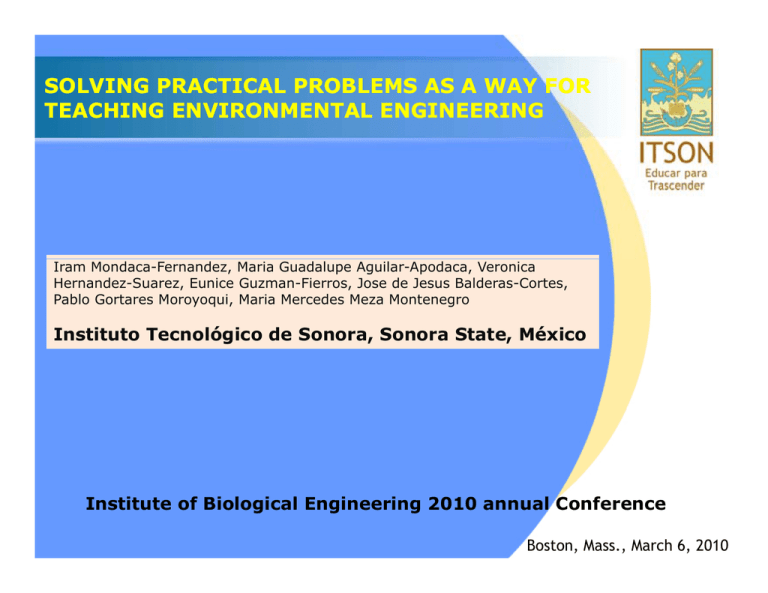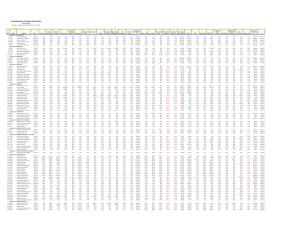Solving Practical Problems as a way for Teaching Environment
Anuncio

SOLVING PRACTICAL PROBLEMS AS A WAY FOR TEACHING ENVIRONMENTAL ENGINEERING Iram Mondaca-Fernandez, Maria Guadalupe Aguilar-Apodaca, Veronica Hernandez-Suarez, Eunice Guzman-Fierros, Jose de Jesus Balderas-Cortes, Pablo Gortares Moroyoqui, Maria Mercedes Meza Montenegro Instituto Tecnológico de Sonora Sonora, Sonora State, State México Institute of Biological Engineering 2010 annual Conference Boston, Mass., March 6, 2010 Outline: • • • • Instituto Tecnológico de Sonora Regional Development BS P Program: Bi Biotechnological t h l i l Engineering E i i Environmental Engineering Education • Traditional • Study d off regionall wastes • Project development for student education • Regional problem solving Boston, Mass., March 6, 2010 Instituto Tecnológico g de Sonora •Northwest N th t off Mé México i •Yaqui Valley-- agriculture and small industrial activity •A lot of solid residue from pig, cow and chicken farms •Significant Significant amount of vegetable waste: carrot, chili, tomato •Most of the wastewater do not receive treatment. Boston, Mass., March 6, 2010 Participation of University in Regional Development •International District of Agribusiness •Experimental p and Technology gy Transference Center •Research and Innovation Center in Environmental and Agricultural Biotechnology •Third Europe-Latin American Forum for Regional Development Boston, Mass., March 6, 2010 BIOTECHNOLOGICAL ENGINEERING COURSES Process Analysis Quality Systems Process Design Vegetal & Environmental Biotechnology Formación Empresarial II Bioquímica Microbiana Biología Molecular Tópicos de Biotecnología Práctica Profesional II Educación Ed ió Ecológica Termodinámica Básica Fenómenos de transporte Métodos numéricos Optativa I Práctica Profesional III Contextual II Álgebra Lineal Básica Ecuaciones Diferenciales Balance de Materia y energía Operaciones unitarias Optativa II Optativa III Deporte y Salud Arte y Creatividad Mecánica General C/Lab Fisicoquímica Bioestadística Diseño de Experimentos Ingeniería de Procesos Optativa IV Lenguaje Matemático Cálculo I Cálculo II Microbiología General C/Lab Métodos Instrumentales de Análisis C/Lab Ingeniería de sistemas Ingeniería De costos Ingeniería de Fermentaciones Química Inorgánica C/Lab Química orgánica básica Bioquímica General C/Lab Bioquímica de Alimentos C/Lab Análisis de Alimentos C/Lab Instrumentación industrial Bioingeniería Certificación de Procesos General Education Engineering Introduction Desarrollo Personal I Desarrollo Personal II Formación Empresarial I Pensamiento Crítico y Comunicación I Pensamiento Crítico y Comunicación II Contextual I Introducción a la biotecnología Analytical Engineering Techniques Foundamentals Práctica Profesional I Environmental Engineering Education: Traditional, Traditional 20022002-2006 •Students analyzed model wastes in Lab •Students made a lab report •Some lab projects include compost, silage and wastewater treatment Lab reports Good technicians Boston, Mass., March 6, 2010 Academic project: manual lab reports vs. project proposals Objective: Develop team work, analysis/synthesis and problem solving skills Strategy: •Half of the student teams—traditional Lab sessions •Half of the student teams- working with regional wastes Planning 2007-2008: •One year in advance: reagents, materials, lab space Analysis of results: •Analysis of projects by professor •Student survey Boston, Mass., March 6, 2010 Academic project: manual lab reports vs. project proposals Survey: eight questions with a 1-5 range of values to answer 1 LABORATORY FOUNDAMENTALS 2 PRACTICAL LAB SKILLS 3 SCIENTIFIC KNOWLEDGE 4 TECHNICAL PROBLEM SOLVING 5 REGIONAL PROBLEM SOLVING 6 WASTE TREATMENT DESIGN 7 PROFESIONAL DEVELOPMENT 8 ENVIRONMENTAL AREA VOCATION Boston, Mass., March 6, 2010 Academic project: manual lab reports vs. project proposals Result of survey Boston, Mass., March 6, 2010 Academic project: manual lab reports vs. project proposals New skills developed: team working with regional wastes, team work, analysis/synthesis and problem solving skills Products: Traditional Projects Grass and corn silage Carrot, fish waste silage, lab scale, pilot scale proposal Aerobic treatment of domestic wastewater Anaerobic treatment of slaughterhouse wastewater, lab scale Kit h Kitchen waste compost t t Milk farm manure compost , lab scale, Milk f t l b l farm scale proposal Additional projects: ethanol from carrot waste, lab scale Boston, Mass., March 6, 2010 Proposal of Education 20082008-2009: p Regional liquid and solid waste Lab analysis Bioprocess for Bi f treatment t t t or added value Proposal of solution Boston, Mass., March 6, 2010 2009--2010 Challenge: 2009 g Solving g regional g problems p Make compost Silage losses by molds 106 Tons/year of wheat straw Improve the process Pellets No till Gassification Boston, Mass., March 6, 2010 2009--2010 Challenge: 2009 g Solving g regional g problems p Carrot and vegetable waste Minimal processed products, dried products Carotenoids, capsaicinoids Arsenic, pathogens in water Municipal treatment Household treatment Boston, Mass., March 6, 2010 2010--2011 New p 2010 paradigm: g problem p solving g Problematic situation Solid or liquid waste proposal lab field results Boston, Mass., March 6, 2010 Opportunities: •A place in the University farm to make projects with agricultural wastes •A p place in the industrial district to add value to wastes and foods •Management of a small town wastewater treatment plant (the plant was constructed in the land of our University) Challenges: •Change of mental paradigms of local producers •Funding Challenges and opportunities: •Interdisciplinary p y work (interdepartmental ( p work)) •Collaborative work with other universities Boston, Mass., March 6, 2010 Questions? Questions ? Boston, Mass., March 6, 2010
